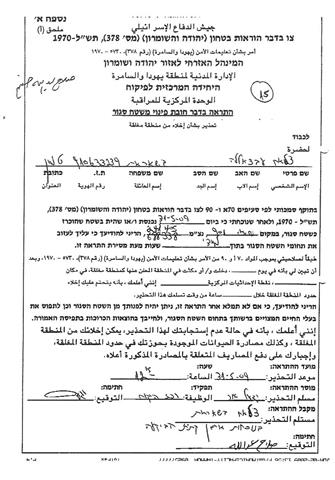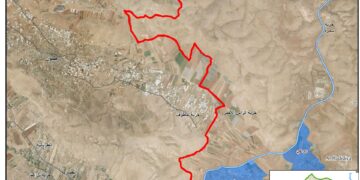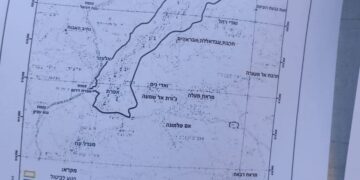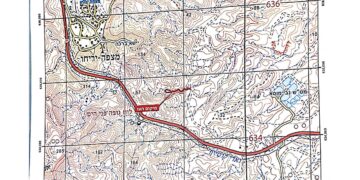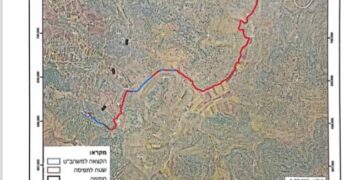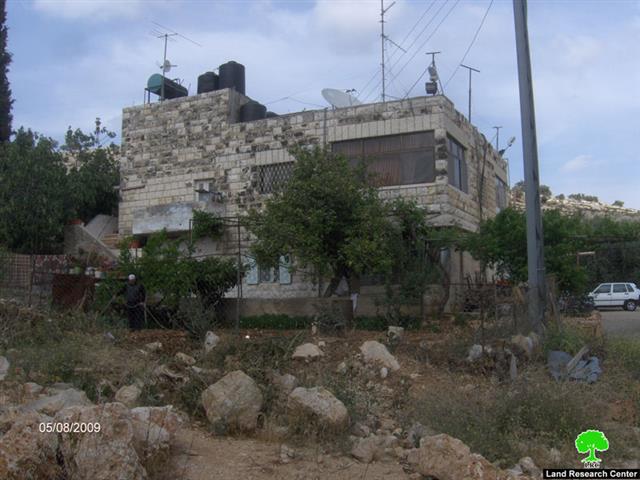Al Hadidiya and Ar Ras Al Ahmar Hamlets: Location & Population
Al Hadidiya Hamlet has a population of around 200, and is one of two communities that were targeted by military orders; the hamlet is located east of ‘Roi & Beqa’ot’ Israeli settlements and west of Hemdat settlement. Evidently the Israelis seem to believe that the two Palestinian Hamlets located among Israeli settlements, threatens their future expansion plans and hinders their contiguity. This is absolutely right, and both the settlements and the Israeli Army see eye to eye on this and the use of ‘Closed Military Areas’ pretext is only to realize the settlers’ aspiration to bring their settlements closer to gather into one big cluster and to accommodate their false claim of the so-called natural growth of settlements in the West Bank.
| Table 2: Israeli settlements located in the vicinity of Al Hadidiya and Ar Ras Al Ahmar Hamlets |
| Notes |
Area |
Pop. |
Establishment
Date |
Settlement
Name |
No. |
| The settlement was established in Sep 1976 as a Nahal (military Settlement) and was converted to a civilian Moshav (Agricultural) two years later |
1572 |
128 |
1976 |
Ro’i |
1 |
| Moshav Settlement (Agricultural) |
2352 |
200 |
1972 |
Beqa’ot |
2 |
| Hemdat was first established in 1980 as a Nahal military outpost and was soon demilitarized and turned into a kibbutz when turned over to residential purposes |
316 |
150 |
1980 |
Hemdat |
3 |
| |
|
|
Total |
Source: ARIJ GIS Database – 2009
Map 1: the targeted communities with the 32 MO
The 2nd community which was targeted by the Israeli Occupation Authorities was Ar Ras Al Ahmar hamlet. The hamlet is located to the northwest of Ro’I and Beqa’ot settlements and is inhabited by more than 300 people, out of which, 140 are threatened of evacuations and displacement under the same pretext (being located in a closed military area). The hamlet was targeted with 17 military orders. See Table 1
House demolition in light of human rights, international covenants and treaties
Adequate housing is one of the basic needs and rights of each person, where ‘the right to adequate housing is the right of every woman, man and child to a place to live in security and dignity.’
In the occupied Palestinian territory, Israel as an occupier should abide by the international human rights treaties to which it is a state party including: The International Covenant on Economic, Social and Cultural Rights (ICESCR) and the International Convention on the Elimination of All Forms of Racial Discrimination,. As an occupier Israel should also abide by the international humanitarian law including: The Hague Regulations and the Forth Geneva Convention. The demolition of houses in Al Hadidyia and Ar Ras Al Ahmar hamlets and the evacuation of its citizens is a stark violation of these rights and covenants. Israel should be held accountable for its acts in occupied Palestinian Territory; should comply with the international legitimacy, laws treaties and United Nations’ resolutions; and Israel’s long time apathy of the international community’s wills must come to an end.
Following is a synopsis of Articles within these covenants, conventions and laws that address the issue of house demolitions and forced evictions under these articles:
International Covenant on Economic, Social and Cultural Rights
-
Article 11 (1): ‘The States Parties to the present Covenant recognize the right of everyone to an adequate standard of living for himself and his family, including adequate food, clothing and housing, and to the continuous improvement of living conditions’.
International Convention on the Elimination of All Forms of Racial Discrimination (1965)
-
Article 5: ‘States’ Parties undertake to prohibit and eliminate racial discrimination in all of its forms and to guarantee the right of everyone, without distinction as to race, color, or national or ethnic origin, to equality before the law, notably in the enjoyment of the following rights: … (e) in particular … (iii) the right to housing’.
Universal declaration of human rights, Article 17:
1. ‘Everyone has the right to own property alone as well as in association with others.’
2. ‘No one shall be arbitrarily deprived of his property.’
Article 25:
1. ‘Everyone has the right to a standard of living adequate for the health and well-being of himself and of his family, including food, clothing, housing and medical care and necessary social services, and the right to security in the event of unemployment, sickness, disability, widowhood, old age or other lack of livelihood in circumstances beyond his control.’
The Fourth Geneva Convention
-
Article 53: ‘Any destruction by the Occupying Power of real or personal property belonging individually or collectively to private persons, or to the State, or to other public authorities, or to social or cooperative organizations, is prohibited, except where such destruction is rendered absolutely necessary by military operations.’
-
Article 47: ‘Protected persons who are in occupied territory shall not be deprived, in any case or in any manner whatsoever, of the benefits of the present Convention by any change introduced as the result of the occupation of a territory, into the institutions or government of the said territory, nor by any agreement concluded between the authorities of the occupied territory and the Occupying power, nor by any annexation by the latter of the whole or part of the occupied territory.’
-
Article 147: ‘Grave breaches to which the preceding Article relates shall be those involving any of the following acts … extensive destruction and appropriation of property, not justified by military necessity and carried out unlawfully and wantonly.’
Hague Regulations 1907
-
Section II Article 23: ‘it is especially forbidden- to destroy or seize the enemy’s property, unless such destruction or seizure be imperatively demanded by the necessities of war.’
-
Section III Article 46: ‘Family honor and rights, the lives of persons, and private property, as well as religious convictions and practice must be respected. Private property cannot be confiscated.’
Agenda 21 (UNCED, 1992)
Chapter 7.6: ‘Access to safe and healthy shelter is essential to a person’s physical, psychological, social and economic well-being and should be a fundamental part of national and international action. The right to adequate housing as a basic human right is enshrined in the Universal Declaration of Human Rights and the International Covenant on Economic, Social and Cultural Rights. Despite this, it is estimated that at the present time, at least one billion people do not have access to safe and healthy shelter and that if appropriate action is not taken, this number will increase dramatically by the end of the century and beyond.’
‘People should be protected by law against unfair eviction from their homes or land’.
To Conclude:-
The constant Israeli violations of the Palestinians’ right to housing and their defiance of international law must come to an end. Israel’s military control of the Palestinian land must also stop and it must be made clear that the only illegal existence in the occupied Palestinian territory are the Israeli Army and the Israeli settlers and both of them must be evacuated if peace is ever to prevail on this land. The Palestinian suffered and yet continue to suffer for the last 62 years because of the Israeli occupation.
|
‘Any violence by a large population is not because the people is more violent than any other. It’s an alarm, it’s a sign, it’s a signal that something is wrong in the treatment of this population.’ By: Amira Hass
|
The international community is also no longer tolerant of the Israeli occupation not its violations of Palestinians’ rights; also they are no longer able to put up with the Israeli settlers violation and the Israeli consecutive governments leniency with the settlers, or their clear disregard of international law and UN resolutions and human rights conventions; demolishing all hopes of the moderated and civilized nations longing for Peace in the Middle East.


